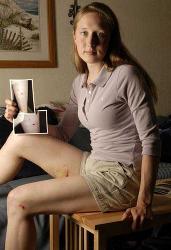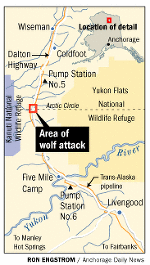|
Woman escapes after wolf pounces -
Campground: Attacks on humans are unusual but not unprecedented
July 13, 2006
By Katie Pesznecker [email protected]
or 907-257-4589
Anchorage Daily News
Anchorage, Alaska
To submit a Letter to the Editor: [email protected]

Becky Wanamaker learned after the attack that she probably should have
stood her ground rather than run from the animal. State wildlife
biologist Mark McNay said the wolf was most likely habituated to
humans. - Photo by Marc Lester, Anchorage Daily News. [email protected]

The wolf saw Becky Wanamaker first.
She was strolling through a campground just off the Dalton Highway, along the Arctic Circle, waiting for her four traveling companions to wake up. A long day in the car ahead, she decided to stretch her legs. Then she saw the wolf. Its eyes fixed on her. The animal was mostly gray and bigger than a husky, Wanamaker said Wednesday, now safely home in Anchorage after Friday's attack. And it had long, long legs. "And I don't remember if it was moving toward me or if it was stopped when I first saw it," she said. "But I just freaked and I bolted and ran toward the (campground) outhouses. That's what was in my head -- run faster, get inside. I kept running -- just thinking, don't fall. If you fall, you're done." But wolves run faster than schoolteachers. "I felt it sink its teeth into the back of my right leg and release," recalled Wanamaker, who teaches deaf and hearing-impaired children at Russian Jack Elementary. "I kind of stumbled and kept running, and he sunk his teeth into the back of my other leg. I screamed. I was screaming for help. I knew people were there. I wasn't sure if they could hear me, but I screamed." And as she screamed, she made it to the outhouse. Wanamaker took deep breaths, calmed herself and pulled at her pant legs: Four red teeth marks had cut the skin behind her left knee, one decidedly deeper than the others. A gash had torn across her inner right thigh. Two puncture wounds dotted the back of that leg, with a third behind the knee. Luckily, there wasn't a lot of blood, Wanamaker said. She waited, then cracked the door and peered out. No wolf in sight. She sprinted as hard as she could to the next outhouse down -- one closer, she recalled, to a couple camping nearby. Safely inside, she rested. She peeked out. The wolf was back. Waiting. Standing across the parking lot. Just watching her. She shut the door again and waited longer. Next time she looked out, the wolf was gone. She screamed to the campers nearby and they finally heard her. "I told them I'd been bit by a wolf and asked, would they drive me to my friends," Wanamaker said. "The poor couple was kind of shocked. They're like, 'Are you serious?' " The wolf attack was the final disaster in a summer road trip sprinkled with freak accidents: A tire on the group's Jeep went flat and shredded en route to Prudhoe Bay. Heading south again, a truck kicked up a rock that shattered one of the Jeep's windows. "It was epic, really," Wanamaker said. "A crazy adventure." She can look at it that way now. She's back home and midway through a battery of rabies shots, but otherwise OK. It took a while to get there. Her friends at the camp site tended to her wounds and loaded her into the jeep. Destination: Medical help in Fairbanks. There was no cell phone service. Roughly five hours later, Wanamaker checked into Fairbanks Memorial Hospital. "And as soon as I got into the hospital, it was like all of my strength left and I was just overcome," she said. That was her meltdown moment: She broke down crying. "I finally allowed myself to think about it," she said, back at her Midtown home. She expects to be telling her wolf attack story to her students when school starts next month. Wolf attacks on humans are unusual, but not unprecedented, according to state wildlife biologist Mark McNay, who spent two years researching wolf attacks in North America and came up with 13 such attacks in the past 30 years through 2000. Most involved habituated wolves that had lost their fear of people, McNay told The Associated Press. There have been more attacks in the past six years: A man was killed by a wolf while hiking in the Canadian province of Saskatchewan in 2005, and a jogger there was attacked and severely bitten in 2004. Wolves also have attacked people in Alaska, McNay said. Six years ago, a wolf attacked a 6-year-old in a Southeast logging camp in Icy Bay. The wolf tried to drag the child away before the animal was shot, McNay said. McNay had little doubt it was a wolf that attacked Wanamaker. It was likely not rabid, but probably habituated. Because of its behavior and the fact it was alone, McNay said, it may have been a young wolf, probably a yearling. "Those are the kinds of wolves that are typically by themselves and often show up at campgrounds," he said Wanamaker learned after the attack that running from the wolf was probably the worst thing to do. A researcher with the Department of Fish and Game told her it's better to "stand him down, throw rocks" then run, she said. "You hear so much about what to do when you see moose and bears, but you don't hear a lot about wolves even being seen," Wanamaker said. "And now I know what to do if I see a wolf again. I definitely want to even be more cautious. And I love the outdoors. This isn't going to keep me away from that." Doctors in Fairbanks closed the gash on her inner thigh with stitches. She was given a rabies vaccine, and immunoglobulin was injected into her wounds. That part hurt, Wanamaker said. She has a few rabies shots still to go, but they don't hurt badly, she said. Her wounds are still sore. Bruises have formed around them. But they're healing, she said. Wednesday night, the pants Wanamaker wore during the attack sloshed around in her washing machine. They were covered with blood, she said. They're also full of wolf-teeth holes. Will she keep them? Maybe. "I haven't decided if it's too traumatic or if it's cool."
Copyright 2006, Anchorage Daily News.
|